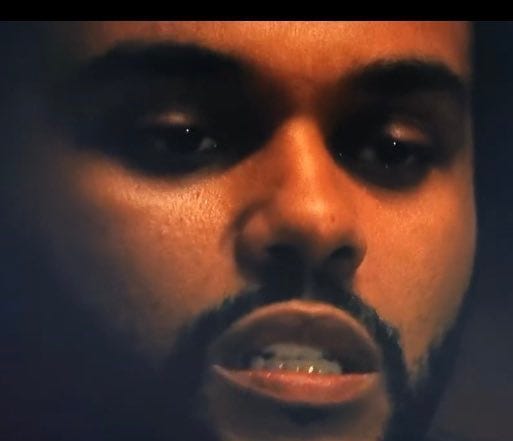The Death of the Oblivious Performer
On Stephen A. Smith, The Idol, and the curse of self-awareness
I. Figuratively Speaking
I’d grown quite tired of Stephen A. Smith by the time that he told Kevin Durant to kill himself. Smith’s appeal—his unchecked bravado, his complete self-assuredness, his constantly wavering articles of utmost faith—had largely faded. When you put a man in front of a mic for sixteen hours a day, it’s only right that they eventually run out of things to say. But for a brief moment, I felt I was watching Stephen A. Smith with new eyes.
The premise is simple enough. Smith and Kendrick Perkins, his latest and laziest foil, are discussing a beef between Kevin Durant and Charles Barkley, the type of hook that could structure any sports talk television segment for the past five years. Smith, dressed in a black Lakers varsity jacket, looks about as tired of the conversation as everybody else. Having pored over the clip countless times, I’ve come to the conclusion that it was his fatigue, moreso than anything else, that enables what comes next. Smith starts into the cadence, the one you’ve heard a million times, that precedes a Smith proclamation: his voice slows, his articulation grows razor-sharp, his voice swings from soft lull to deep bellow.
“And when you’re that ticked off,” Smith begins, “at some point in time…” For a split second, Smith looks off screen as if he’s consulting a teleprompter, an explanation rendered impossible by what follows. In this fleeting moment, you see Smith decide to give in to whatever has overcome him. “Whether it’s now or later, you gon’ have to look at you, and not just the people,” Smith pauses momentarily, “who are talking.” Smith barely permits himself a smile before the money shot: “In other words, before you kill the messenger, you might want to kill yourself.” The deed is done, perfected by the sort of pseudo-redemptive flourish that only Smith could conjure: “Figuratively speaking.”
The clip is impossibly funny in a way that only a clip of Stephen A. Smith can be. There’s, of course, the horrific faux pas—Kevin Durant is hardly told to kill himself by his adored foes on Twitter, much less TV hosts—but what makes the clip a Smith masterclass is the structure around the line: the backdoor safety valve of “figuratively speaking,” the complete misconstruing of a cliché that enables the entire moment, the sly grin of a man convinced he knows it all. For twenty seconds, played over and over again, I can remember why I loved Stephen A. Smith.
II. A Brief Diagnosis
Chief among the great sins of twenty-first century media is obviousness. If art is rendered meaningful through interpretation, perhaps the reason that everything feels so flat is because of how clearly our media wishes to convey a point. The act of engaging with popular culture feels increasingly like completing a homework assignment: every celebrated television show about one form of grief or trauma, each celebrated album one mode of longing or identity-construction through pointed pastiche. Go ahead, read Zadie Smith on Tár, but the Academy Award goes to Everything Everywhere All At Once. The rare culture does feel challenging or open to interpretation is the equally uninspired intentional mindfuck, the self-knowingly “difficult” work, art as sloppily designed puzzle.
I’m inclined, as with other areas of cultural anemia, to blame this obviousness on algorithmic forces. Obvious media is easily categorized media, and the dominant mode of producing and disseminating media depends first and foremost upon categorization.
III. Stretch That Tiny, Little Premise
The Idol, HBO’s largely-panned big ticket Sam Levinson and the Weeknd vanity project, ended recently, meaning the conversation around The Idol will soon end with it. By now, the sides in The Idol wars have been drawn: the show was nearly universally condemned by tastemakers and audiences for its crassness and—yes—its obviousness, which means that a handful of provocative and thoughtful critics have made it their missions to identify the show’s redeeming and subversive qualities.
The Idol is criticized for being disturbing, a critique that appears to miss the point both because the show in and of itself is far funnier than it is genuinely off-putting and also because darkness is not something that need be breathlessly shied away from. However, The Idol was responsible for the single most dispiriting pop cultural moment of the year. As the program’s early episodes began to roll out, the show appeared to have obviously failed by its own metrics: The Idol was panned at Cannes, mocked by fans. Its defenders, as best I understood them, argued first and foremost that the show was a satirical exercise in unseriousness. The Idol, the argument went, was so morbidly off-kilter that it was best understood as an implicit skewering of the entertainment world—both its machinations and our expectations of it. The show’s subversive value, to the extent it had one, lay in its ability to portray the shame of self-seriousness by creating a shamefully self-serious show about shamefully self-serious caricatures; it was an argument that allowed The Idol to be brilliant insofar as it matched mode to subject: The Idol could be great so long as it committed to its prestigious artifice.
The problem with artifice is that it requires maintenance. And so when The Weeknd—a man whose instincts went from appearing razor-sharp to Titanic-submersible-disastrous in about four months time—started leaning into the bit on Twitter, the thing exploded. The Weeknd, like anybody preoccupied with their image and likeness, appears to search his name on Twitter. It seems that upon encountering almost universal disdain for his show in general and his acting in particular, he employed the great defense of the twenty-first century: he claimed it was all a bit and leaned in. Watching The Weeknd retweet clip after clip of his performance with the “I’m actually laughing” emoji, circulating the most mocked portions of his passion project as if he were in on the joke, was an act of debasement so visceral as to feel bigger than himself. It felt like watching the mass funeral of the oblivious performer.
IV. The Oblivious Performer (pt. 1)
As with any oppressive cultural trend, however, the era of obviousness has its outliers, generators of fleeting moments of sincere joy, visionaries of a better future. The oblivious performer resists the crisis of obviousness by the mere virtue of their lack of self-knowledge. In a cultural environment chained by self-awareness, the oblivious performer is the rare subject who actually invites interpretation precisely because they’re not in on the bit. If the obvious product demands to be read, discussed, and consumed a certain way, the oblivious performer invites genuine interpretation by their sheer inability to define what it is they’re actually presenting to you.
V. You Got Me There
Stephen A. Smith, like many a performer before him, has lost his edge. The beauty of Stephen A. was that you never knew whether you were laughing at or with him, whether he was a sincere blowhard or a brilliantly, unintentionally subversive provocateur. What made Stephen A. great was his steadfast commitment to professionalism and self-seriousness that contrasted so incompatibly with his antics. Here was the self-righteous, conservative pundit who deigned to tell a generation of young athletes how to live their lives, yet one who couldn’t help but sabotage the premise of his show and agree with Skip Bayless when Bayless, in one of my favorite videos of all time, suggested that Maggie Gylenhall was an underwhelming female lead in The Dark Knight. “You got me there,” laments Stephen A., before lambasting Gylenhall and lamenting that the role didn’t go to Halle Berry, Beyonce, or “someone fine.” Stephen A. was great because his commitment to self-serious artifice allowed for moments of pure, genuinely hilarious surprise.
Like many an iconic oblivious performer, Stephen A. Smith now appears to have figured it out. He, too, reads Twitter and checks the metrics—or at least pays someone who does—and knows what makes the people tick. Where great Stephen A. moments of the past found him outside his depth in seemingly inexplicable fashion, Stephen A. today seems to exist solely to court controversy and outrage, to prompt earnest quote Tweets asking what the hell Stephen’s doing talking about Ukraine. The videos he shares are manicured with the signature TikTok zoom, his verbiage on the topics du jour are self-knowingly overwrought. He seems to have learned what we loved about him, and in the naked chase to replicate it has rendered the whole exercise depressing.
VI. The Oblivious Performer (pt. 2); or, Does He Know?
It’s a nasty feeling, being marketed to. There’s something so bold, crass, reductive; recall the feeling, deep in your stomach, every time someone sends you a meme they thought you’d find funny. This, you ask, is what you think of me?
If the algorithm’s great promise was to render the act of being marketed to invisible, then it has failed tremendously. At their best, algorithms can lull you into the feeling of constant discovery, of a life governed only by comfortable serendipity. I like this thing, and wow, how do you figure, I liked that thing too! Its failure, as has been well documented here among other places, is that its prioritization of comfort and familiarity will always supersede the feeling of discovery or of the new. Algorithms promise eternal pleasant surprise while delivering droll dreck.
The beauty of the unaware performer, then, is the feeling that you are not being pinpointed and sold something by people who view you as nothing more than a unit of data and a reserve of profit. The unaware performer is selling something, surely—every performer now does—but in their failure to understand themselves, there is no possibility that they could be pandering to you. You can’t algorithm-bait the preferences of others when you don’t even know yourself. The unaware performer: the last bastion of serendipity in a world intent upon mapping everything.
VII. He Knows
The self-awareness trap has come for the oblivious performer, making the new wave of obviousness even more discouraging than the one we’re already awash in. The joy of watching Nathan Fielder always lay somewhere in the disbelief you felt that a person position himself as the butt of a joke while sacrificing innocent people to actually serve as the grist; what to make, then, of The Rehearsal, which spends its entire back half in a sort of tortured self-examination of Fielder and Fielder alone? The first time Kevin Durant joined a Twitter Spaces to shit-talk teenagers, it felt like a revelation; the second time, well, you can ask Marx. Donald Trump’s tweets, the oblivious performance that got him further than any other oblivious performer in history, feel like they’ve been outsourced to wiry, incel interns.
We are witnessing a sea change in self-awareness not unlike that in the later seasons of a reality television show—where performers whose intentions were always tangential to the worth of their work learn what it is they are appreciated for and commit themselves to bland reproduction. The shift transforms audiences from independent, autonomous interpreters to something like clapping seals; all media, it appears, tends toward infantilization, taking its perceiver for a child pleading “again, again!”
It’s not that all self-aware culture is inherently obvious; self-awareness, too, can be thoughtfully inverted. In the recent Asteroid City, for instance, Wes Anderson uses his memed-to-death, impossible self-aware aesthetic trappings to render legible an otherwise incredibly messy and, if adequately mined, potentially brilliant film. In the more mundane world of the free-on-Amazon-streaming Jury Duty, a similarly obvious premise—what if a regular, real person got Truman Show’d—permits what should have been an also-ran streaming disaster into a potentially thoughtful and genuinely entertaining examination of popular society’s understanding of a nice guy. The Kardashians are interesting not because of the personas they’ve created but because of the way in which they illuminate the act of identity and image-construction at the highest level (watching the Kardashians discuss editorial decisions about their show, on their show, is more intellectually rewarding than any of the Synedcoche, New York knock-offs currently in vogue).
But the vast majority of obvious culture uses its self-awareness not as a tool or hook but as an end in and of itself. It’s this form of self-awareness that we see once great oblivious performers slide lifelessly into: self awareness as nothing more than algorithm optimization. The most evocative meme of the last year—“Does He Know?”—has been replaced, perhaps permanently, with its own answer.
VIII. Into the Mind of Json (An Ill-Advised Outro)
The oblivious performer is an endangered species, which is not to say it is extinct. As I write this, The Mind Of Json, perhaps the greatest oblivious performer in a generation, continues to Tweet from the emergency room due to a combination of extreme hypertension and sleep deprivation. Over the course of 18 hours, Json posted a video of himself drenched in sweat, coming to terms with a sort of cosmic punishment damning him to sleep deprivation; a signature, apparently inedible meal dumped into a plastic container on a desperately dirty coffee table; two throwback memes; a video with the caption “i think Ive lost it”; a sexual-anatomical question so foul that it can’t in good faith be hyperlinked; three similarly foul throwback memes; an image of CityMD where he jokes that he’s going to “see if he’s oregnant (sic);” a readout of his blood pressure indicating a hypertensive emergency; news that he is going to the emergency room; a throwback meme; a promise to eat his nurse’s ass; an image of his blood pressure in even worse condition; a video of himself receiving an intravenous injection; a throwback meme; a video of his heart rate monitor sounding like a footwork track; a photo of a hospital sandwich with two sides of Suncup Cranberry Juice Cocktail; a photo of a police officer’s gun with the caption “Ima grab it;” and a four and a half star review of Rob Schneider’s comedy special “Woke Up in America.”
Json is both occasionally, intentionally funny with his prolific meme creation and almost always interesting as a character study in the perils of horniness, experimental cooking, streaming service deep-diving, and elusive sleep. He is the sort of oblivious performer who defies categorization, one with whom you sometimes laugh, at whom you sometimes laugh, and about whom you always think. I would have a harder time explaining Json’s appeal to a well-adjusted friend than I would stomaching one of his late-night meals, and it’s for exactly that reason that his live-tweeting his potentially fatal trip to the hospital is one of the most awe-inspiring performative acts in recent memory. I pray that he survives.
You can donate to Json’s medical expenses here.






